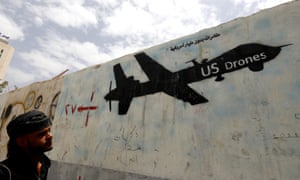America dropped 26,171 bombs in 2016. What a bloody end to Obama's reign
According to new figures, the US dropped nearly three bombs every
hour, 24 hours a day. Dare we think how Donald Trump will continue this
legacy?

Most
Americans would probably be astounded to realize that the president who
has been painted by Washington pundits as a reluctant warrior has
actually been a hawk. The Iran nuclear deal, a herculean achievement,
and the opening of diplomatic relations with Cuba unfortunately stand
alone as President Obama’s successful uses of diplomacy over hostility.
While candidate Obama came to office pledging to end George W Bush’s wars, he leaves office having been at war longer than any president in US history. He is also the only president to serve two complete terms with the nation at war.
President Obama did reduce the number of US soldiers fighting in Afghanistan and Iraq, but he dramatically expanded the air wars and the use of special operations forces around the globe. In 2016, US special operators could be found in 70% of the world’s nations, 138 countries – a staggering jump of 130% since the days of the Bush administration.
While candidate Obama came to office pledging to end George W Bush’s wars, he leaves office having been at war longer than any president in US history. He is also the only president to serve two complete terms with the nation at war.
President Obama did reduce the number of US soldiers fighting in Afghanistan and Iraq, but he dramatically expanded the air wars and the use of special operations forces around the globe. In 2016, US special operators could be found in 70% of the world’s nations, 138 countries – a staggering jump of 130% since the days of the Bush administration.

While most of these air attacks were in Syria and Iraq, US bombs also rained down on people in Afghanistan, Libya, Yemen, Somalia and Pakistan. That’s seven majority-Muslim countries.
One bombing technique that President Obama championed is drone strikes. As drone-warrior-in-chief, he spread the use of drones outside the declared battlefields of Afghanistan and Iraq, mainly to Pakistan and Yemen. Obama authorized over 10 times more drone strikes than George W Bush, and automatically painted all males of military age in these regions as combatants, making them fair game for remote controlled killing.
President Obama has claimed that his overseas military adventures are legal under the 2001 and 2003 authorizations for the use of military force passed by Congress to go after al-Qaida. But today’s wars have little or nothing to do with those who attacked the United States on September 11, 2001.

What does the administration have to show for eight years of fighting on so many fronts? Terrorism has spread, no wars have been “won” and the Middle East is consumed by more chaos and divisions than when candidate Barack Obama declared his opposition to the invasion of Iraq.
While the switch from US troops on the ground to airstrikes and special forces has saved US lives, untold numbers of foreign lives have been snuffed out. We have no idea how many civilians have been killed in the massive bombings in Iraq and Syria, where the US military is often pursuing Isis in the middle of urban neighborhoods. We only sporadically hear about civilian killings in Afghanistan, such as the tragic bombing of the Doctors Without Borders hospital in Kunduz that left 42 dead and 37 wounded.
Pushed to release information about civilian deaths in drone strikes, in July 2016 the US government made the absurd claim it had killed, at most, 116 civilians in Pakistan, Yemen, Somalia and Libya between 2009 and 2015. Journalists and human rights advocates said the numbers were ridiculously low and unverifiable, given that no names, dates, locations or others details were released. The London-based Bureau of Investigative Journalism, which has tracked drone strikes for years, said the true figure was six times higher.
Given that drones account for only a small portion of the munitions dropped in the past eight years, the numbers of civilians killed by Obama’s bombs could be in the thousands. But we can’t know for sure as the administration, and the mainstream media, has been virtually silent about the civilian toll of the administration’s failed interventions.
In May 2013, I interrupted President Obama during his foreign policy address at the National Defense University. I had just returned from visiting the families of innocent people killed by US drone attacks in Yemen and Pakistan, including the Rehman children who saw their grandmother blown to bits while in the field picking okra.
Speaking out on behalf of grieving families whose losses have never been acknowledged by the US government, I asked President Obama to apologize to them. As I was being dragged out, President Obama said: “The voice of that woman is worth paying attention to.”
Too bad he never did.
Pollution, populism and presidentials…
… will these define the 2020s? This has been a turbulent decade across the world – protest, austerity, mass migration. The Guardian has been in every corner of the globe, reporting with tenacity, rigour and authority on the most critical events of our lifetimes. At a time when factual information is both scarcer and more essential than ever, we believe that each of us deserves access to accurate reporting with integrity at its heart.We have upheld our editorial independence in the face of the disintegration of traditional media – with social platforms giving rise to misinformation, the seemingly unstoppable rise of big tech and independent voices being squashed by commercial ownership. The Guardian’s independence means we have the freedom to set our own agenda and voice our own opinions. Our journalism is free from commercial and political bias – never influenced by billionaire owners or shareholders. This makes us different. It means we can challenge the powerful without fear and give a voice to those less heard.
None of this would have been possible without our readers’ generosity – your financial support has meant we can keep investigating, disentangling and interrogating. It has protected our independence, which has never been so critical. We are so grateful.
More people than ever before are reading and supporting our journalism, in more than 180 countries around the world. And this is only possible because we made a different choice: to keep our reporting open for all, regardless of where they live or what they can afford to pay.
As we end 2019 and enter a new decade, we hope you will consider offering us your support. We need this so we can keep delivering quality journalism that’s open and independent. And that is here for the long term. Every reader contribution, however big or small, is so valuable.

No comments:
Post a Comment